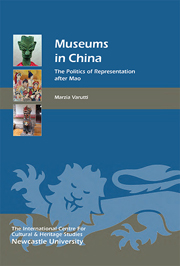Book contents
- Frontmatter
- Contents
- List of Illustrations
- Acknowledgments
- Chronology
- List of Abbreviations
- Introduction
- 1 Cultural Heritage in China
- 2 Museums in China: origins and Development
- 3 New Actors in the Chinese Museum World
- 4 Museum objects and the Chinese nation
- 5 The nation in the Museum
- 6 The Politics of the Past
- 7 The Representation of the Past in China's Museums
- 8 The Politics of identity
- 9 The Museum Representation of ethnic Minorities
- 10 Techniques and sites of Display of ethnic Minorities
- Conclusions: The new Museums of China
- Appendix: List of Museums in China Visited by the Author
- Bibliography and References
- Index
- Heritage Matters
3 - New Actors in the Chinese Museum World
Published online by Cambridge University Press: 05 March 2014
- Frontmatter
- Contents
- List of Illustrations
- Acknowledgments
- Chronology
- List of Abbreviations
- Introduction
- 1 Cultural Heritage in China
- 2 Museums in China: origins and Development
- 3 New Actors in the Chinese Museum World
- 4 Museum objects and the Chinese nation
- 5 The nation in the Museum
- 6 The Politics of the Past
- 7 The Representation of the Past in China's Museums
- 8 The Politics of identity
- 9 The Museum Representation of ethnic Minorities
- 10 Techniques and sites of Display of ethnic Minorities
- Conclusions: The new Museums of China
- Appendix: List of Museums in China Visited by the Author
- Bibliography and References
- Index
- Heritage Matters
Summary
According to Howard Becker (1982, x), the concept of an ‘art world’ refers to a ‘network of people whose cooperative activity, organized via their joint knowledge of conventional means of doing things, produces the kind of art works that art world is noted for’. Despite its tautological definition, ‘art world’ is a popular and widely used term due to its capacity to capture the fuzzy world that surrounds the production, distribution and consumption of works of art. Drawing on Becker's notion, the concept of the ‘museum world’ can be taken to represent the group of people involved in museum activities, and the relationships that link them to museums.
In China, the participation of non-governmental actors in the museum world might suggest that the state is loosening its control over museums and their activities. The historian of China James Flath (2002, 57) notes that ‘the state is still seeking to divest itself of both the ideological and economic complexities of public history by turning management over to the private sector’. Yet the Chinese state is not so much divesting as delegating the management of specific museum categories, with the twofold advantage of continuing to exert indirect supervision over all museums without incurring the related managing costs, while maintaining direct, full control over a selected range of museums of strategic importance, such as those dealing with the representation of history and the nation.
- Type
- Chapter
- Information
- Museums in ChinaThe Politics of Representation after Mao, pp. 43 - 58Publisher: Boydell & BrewerPrint publication year: 2014

